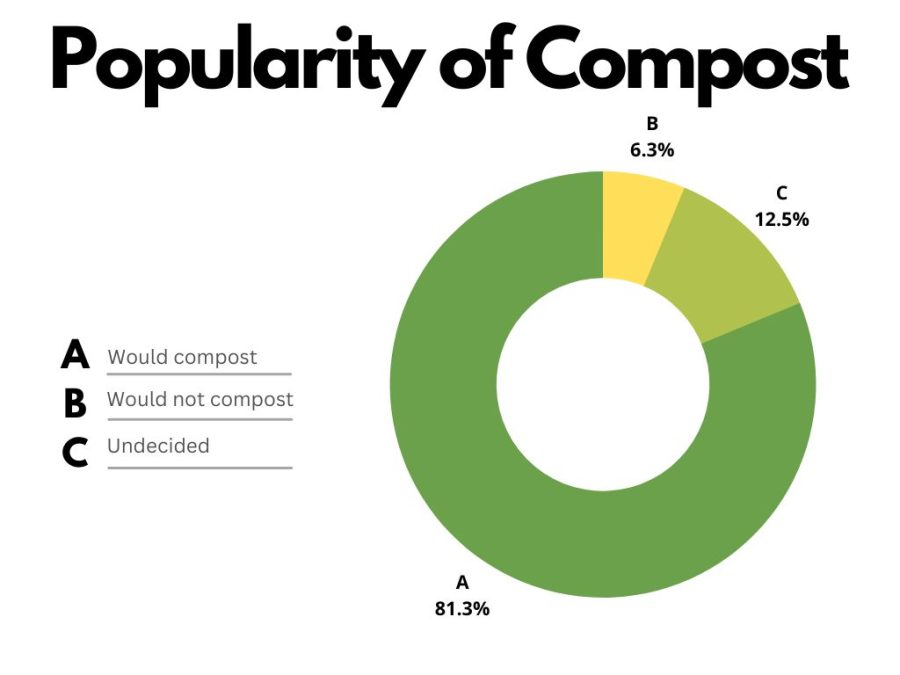Sustainability students call for composting
December 7, 2022
Most people fail to acknowledge the crucial role that food waste plays in their carbon footprints. Between farms, corporations, cafeterias and homes, all wasted food is transferred into landfills, which eventually degrades and results in the release of methane into the atmosphere. A generally well-known fix is to separate food waste from trash and compost it instead. This helps rejuvenate the soil, grow healthier plants and remove harmful gasses from the atmosphere. But how willing is the LOHS community towards the idea of separating food waste from trash? That’s the exact question that a group of passionate students decided to answer.
As a part of LOHS’ Sustainability class taught by Breck Foster, a devoted group of students tackled a project to implement a long-lasting compost system within the LOHS cafeteria. Students first conducted a food audit to collect “data on how much food we as a school waste per day, including packaged or unopened food, wasted liquids such as milk and juice, and any half-eaten food, including banana peels or other similar forms of waste,” said junior Lyra Johnson.
To ensure that the audit would be successful, students set up tables in various locations of the school, each with a trash can and four bins dedicated to packaged food, food waste and liquids. Johnson mentioned that Sustainability students also created a survey that asked LOHS students “what food they didn’t eat, why they didn’t eat it, what food items they would remove from the menu if they could and how willing they would be to compost if that was an option.” A QR code to the survey was taped to each table, and students who answered the questions were given a reward.
The sustainability students additionally faced several issues while conducting the audit, which inflicted possible concerns of inaccurate results. “Our biggest challenge when collecting the data was getting people to approach us so we could help them sort their food,” Johnson stated, “I think they assumed that they were being judged if they didn’t eat all of their food or if they threw large amounts away. We tried to encourage everyone who walked up to us, letting them know that there was absolutely no judgment and that our only goal was to get accurate numbers. People who brought lunch from home also felt less need to approach us, because they could just stick all their food waste back into their lunch box, but we appreciated everyone who put in the extra effort to help us out.”
After collecting all the data from the food audit, the students observed that 12.5 percent of LOHS’ total trash is comprised of food waste, and 81.25 percent of students claimed that they would utilize a composting system if it was available. The food audit also showed that students waste approximately 16,915 lbs of food in a traditional school year, meaning that around 129 lbs of food are wasted in solely a single lunch period. Despite the numbers being quite drastic, Johnson remains optimistic, “I’m excited to see how we improve as sustainability class continues to work toward a more environmentally conscious system.”
Looking to the future, Sustainability students hope to create a petition as a call for action to implement a schoolwide composting system. They aspire to foster a long-lasting compost system, as the school’s previous attempts to compost were unsuccessful due to not being integrated into the school curriculum. To achieve such a goal, Sustainability and Green Team aim to shift LOHS’ composting methods from being student-led to more systematically driven. Although they experienced additional conflicts with the school board regarding more composting initiatives, they continue to build resiliency and remain hopeful with new ideas. A potential step in the right direction is the possibility of a new department assistant course, in which students are trained to take out compost bins, and can also earn a CRLE for participating in the service; although it is not entirely finalized yet, the students hope to implement and offer this class starting next semester.
Overall, the data gathered from the food audit allows students to be more aware of their food waste, and hopefully be more mindful before they throw away any leftovers.


